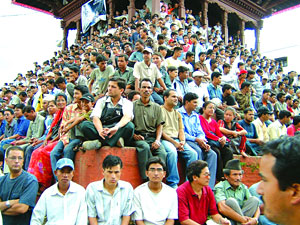 MARTY LOGAN |
Some believe that basing provinces on ethnicity could lead to the country's disintegration. Alternatives should be discussed. Often by ensuring the rights of one group, another will be deprived of its own rights. The recent Tharu uprising against Madhesi identity provides the latest example. Except in the far west and Mithila, there are no instances of a single dominant linguistic group.
Nepali diversity does not mirror that of Switzerland where ethnic and lingual groups rarely overlap. There are no distinct units of English and French speaking groups like in Canada. Nepal can be compared with eastern India to some extent but it is considerably more complex here when it comes to ethnicity. An extensive survey is required to delineate these ethnic and non-ethnic settlements.
Unfortunately, the Maoist proposal to base provinces on ethnicity has lumped all ethnic and non-ethnic groups together. Neither the Maoists nor the groups struggling for identity have ever thought about how to address the identity of different groups within a particular region.
While ethnic autonomy seemed to work under communism in the former Soviet Union, Yugoslavia and Czechoslovakia, it ceased to work when communism collapsed and the countries disintegrated. The Soviet Union and Yugoslavia have now split into different independent states. While the breakup of the Soviet Union and Czechoslovakia was relatively peaceful, the slaughter and ethnic cleansing in the Balkans will haunt us for centuries to come.
There is still time for federalism experts to make a comparative analysis of differing federal structures and to carve out a suitable one for us. The political parties should not delay in agreeing on a stable federal structure taking cultural diversity into consideration. The delay might unleash a series of demands like Tharuhat in Madhes and Greater Kirat in Limbuwan. The current climate of identity politics will open the floodgates to more and more demands from different communities.
Federalism based on single ethnic identity and the concept of sub-nation could result in a prolonged period of instability and anarchy in the country. The Maoists must understand that it will be difficult to meet the conflicting demands of sub-national ethnicities.
The communists must turn democratic no matter how difficult it is. By doing so, they can set an example to the world. They can assure that Nepali people, who are still terrified by the prospect of becoming a 21st century Yugoslavia, feel they are safe. For that, they should correct their past mistakes, dump the single ethnicity based federal units and draw up a map of multi-ethnic federalism.


